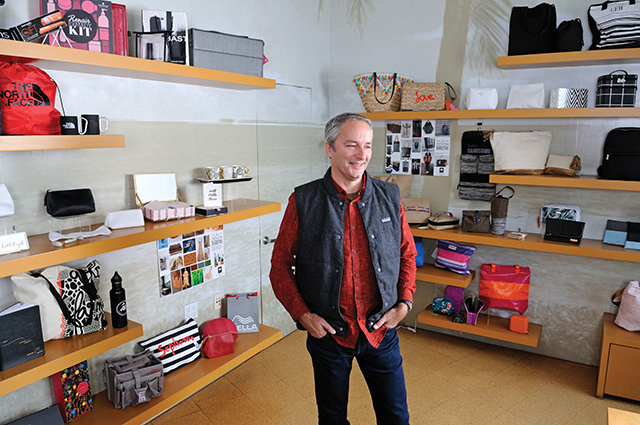A decade ago, Derek Hydon, president of MaCher Inc. in Venice, said, company leaders had no clue about the definition of a sustainable business. They learned fast when one of the company’s largest clients, Procter & Gamble Co., said it would cease to contract with MaCher − a custom designer of gifts-with-purchase, corporate gifts, premium packaging and other promotional items − if MaCher did not begin documenting its progress toward a sustainable business model.
More specifically, P&G had acquired one of MaCher’s largest customers, hair care giant Sebastian International Inc., which operates as a subsidiary of Woodland Hills-based Wella Corp., and, as part of that acquisition, required MaCher to provide a quarterly score card in several key metric areas, including sustainability.
Today, Hydon can point with pride to hydroponic planters supplying fresh lettuce and herbs to employees on the sunny deck overlooking Venice’s fashionable Abbot Kinney Boulevard. A bright red B Corporation certification is on display in recognition of MaCher’s dedication to social and environmental accountability.
The company’s two-story offices display a wide assortment of backpacks, totes, colorful gift bags for cosmetics and other items, 95 percent of which are reusable. The philosophy extends to his work habits: Hydon has no dedicated office, so he reuses any company space for his executive duties.
“Our 100 percent purpose is to make sure that everything we create has a reuse,” Hydon said. “Most businesses in our space have 60 to 70 percent reuse. A lot of products are just thrown away.”
Hydon said some MaCher products support various communities, including artists. For example, a collapsible backpack created for Carnival Corp. Holland America Line’s Alaskan cruises featured reproductions of work by an Alaskan artist of Tlingit and Athabascan descent. The cruise line offered a royalty payment to the artist for each pack.
MaCher was founded in 1983 in Australia by Martin Zoland and Cheryl Cooper, whose first names mash up as MaCher. Hydon, who is British, joined the company in 1992 to expand the company’s design operations to the United States. MaCher purchased its building on Abbot Kinney in 2002, when, Hydon observed, Venice was decidedly less gentrified than it is now.
Product design is done by a staff of about 50 in the United States and Australia, with another two employees in China. The products are made mostly overseas in China, India and Cambodia, among other locations.
“The key to our business is volume,” Hydon said, adding that the company fills orders of between 2,000 and 2 million pieces.
Hydon said companies increasingly recognize that customers want to feel good about their choices. To that end, cruise or tour operators often give clients a choice of a gift or charitable donation. “It shows the consumers that the company is thoughtful,” Hydon said.
Hydon by no means fancies himself a fashion icon but favors one sustainable accessory designed by MaCher, a reusable water bottle that provides its own internal filtration system and can be branded with a company logo. The item serves as a powerful symbol that changing a habit can change the world.
“When I pass through security at LAX, I fill up on the other side. It tastes just great,” Hydon said. “It’s always by my side.”

